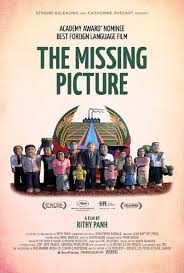
THE MISSING PICTURE/ L’IMAGE MANQUANTE
France/Cambodia, 2013, 92 minutes, Black and white and Colour.
Directed by Rithy Panh.
In the French version of this title, the word ‘manquante’ is more significant than the English ‘missing’. Manquante means ‘lacking’, that the picture is not just missing, it ought to be there. And some of the missing pictures for this film are those in the footage taken in Cambodia in the 1970s, the era of the Khmer Rouge and the killing fields of Cambodia, which no longer exists.
Director Rithy Panh was born in Cambodia in 1964. A young teenager during the troubled times, his parents and family were killed and he himself went into exile in France. In his career as a film-maker, he won awards for his film Rice People in 1994, a look at children who said they received their rice from the UN and had never seen a rice field. He subsequently made quite a number of documentaries and the fiction, based on the novel by Marguerite Duras, The Sea Wall, in 2008.
The Missing Picture was a nominee for the Oscar for Best Foreign Language Film for 2013.
The director supplies a voice-over, recalling his childhood, the appearance of the Khmer Rouge after quiet and cultural and literary times with his family. He shows some photos, incorporates footage taken during the period, especially from the propaganda films made by the Khmer Rouge. But, he is lacking pictures and footage of his family, especially the pathos of his father’s hunger strike and death.
He goes on to explain the ideology of the period, the stamping out of individuality, the attempt to create a society in which everyone was equal – but, was doomed to failure, as young people who were specialists were destined for particular work and the soldiers and authorities lived more comfortably than the ordinary people. We know that thousands were killed, and we know the reference to the killing fields, especially after the striking film of 1984 of that title.
The special device for the film is the director’s asking a friend to create claye models of persons, animals, painting them and the director using them to make tableau of particular scenes for which there was no photographic record. This means they offer a great pathos with audiences responding to the models and imagining what they stood for.
In retrospect, the regime of Pol Pot and the rule of the Khmer Rouge was a period of shocking brutality. This film reminds us that it should not be forgotten.
1. The director, his Cambodian background, exiled from Cambodia at a young age? His international career and filmmaking?
2. Memories, experiences, of Cambodia in the 1970s, the memories of childhood?
3. The history of Cambodia, the background of France and Indochina, the 1960s and the Vietnam war, the bombings of Cambodia by the Americans, the Khmer Rouge and their rule, Pol Pot and his dictatorship, socialism, agrarian socialism, the revolution, the camps, no individuality, the ethos and ideology, the indoctrination, the effect on the young, developing fanaticism, changes in the economy, experts and their being fostered, the limitations on food, prohibitions on fishing, selling mountain rice? The killing fields? The officials?
4. The footage of the period, the Khmer Rouge propaganda films and their making, compulsory screenings, compulsory audiences? The gaps in material available for this film? The idea of the clay puppets? The artist? Making them, shaping them? Painting them? Their size, brought into various scenes, the substitutes for the real people? The role of cinema and understanding of truth?
5. The director’s voice-over, his memories, aged 13, losing his family, recalling the history, dramatising it in the figures in the tableau? The impact of words and images?
6. Coming to terms with the memories?
7. The slogan: To keep you does no benefit, to destroy you is no loss?
8. The American bombings, Pol Pot using them as a justification for his behaviour?
9. The background of music, literature in the director’s family? The transition to hunger, persecution, his father’s hunger strike and death, the effect on the children, children denouncing their parents, the propaganda films?
10. The importance of this film as remembering the past? Its contemporary relevance?